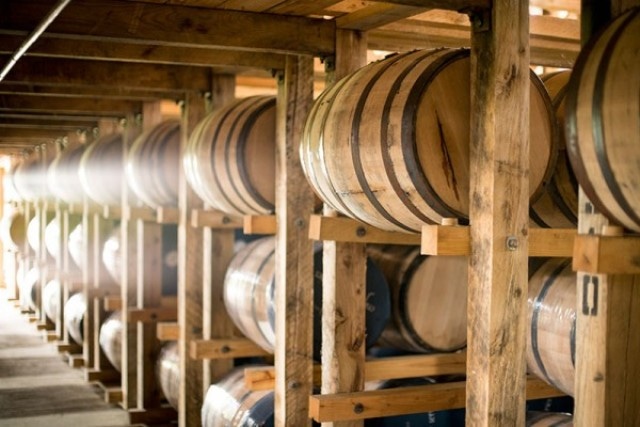Jul 18 2016
Bourbon production is a rich tradition and a flourishing industry in Kentucky. The University of Kentucky, as the flagship research institution of the state, has found a creative way to operate with a local bourbon distillery.
 UK's Center for Applied Energy Research (CAER) has partnered with Wilderness Trail Distillery in Danville, Kentucky to convert stillage, a by-product left over during the bourbon production process, into materials that can be used in batteries, capacitors and water filtration systems. (Credit: University of Kentucky)
UK's Center for Applied Energy Research (CAER) has partnered with Wilderness Trail Distillery in Danville, Kentucky to convert stillage, a by-product left over during the bourbon production process, into materials that can be used in batteries, capacitors and water filtration systems. (Credit: University of Kentucky)
Steve Lipka, associate director at UK’s University of Kentucky Center for Applied Energy Research (CAER), and his partners in the Electrochemical Power Sources group have been looking for rich and sustainable materials that can be transformed into useful products. Hence, in this case, Lipka and his team collaborated with Wilderness Trail Distillery in Danville, Kentucky to analyze stillage, a secondary product left over during the production process of bourbon.
“It's of great value for us to look at industries here in Kentucky that can use those products in a very useful way and have a sustainable type of business,” said Lipka.
Bourbon stillage, which contains grain and water, is commonly used in solid state for feeding cattle. However, Lipka and his team have found different ways of using this stillage in liquid state. They used a process known as hydrothermal carbonization to convert stillage into a solid material made of small, evenly -sized particles, also called green material.
Bourbon stillage at CAER
Researchers at UK’s Center for Applied Energy Research (CAER) are always on the lookout for abundant and sustainable materials that can be converted into value-added products. In this case, CAER has partnered with Wilderness Trail Distillery in Danville, Kentucky to convert stillage, a by-product left over during the bourbon production process, into materials that can be used in batteries, capacitors and water filtration systems. (Credit: University of Kentucky REVEAL Research Media)
In Kentucky, we have this stillage that contains a lot of sugars and carbohydrates so we tried it and it works beautifully. We take these (green materials) and we then do additional post-processing to convert it into useful materials that can be used for batteries.
Lipka
These batteries comprise carbon-monofluoride batteries, the world’s most energy-dense primary batteries. They are used for different applications, which include:
- Automotive: tire pressure monitoring system
- Implantable cardiac pacemakers
- Aerospace
- Commerce: powered credit cards
- Gas and oil exploration: control systems and data logging
- Electronic devices: water, electric and gas meters, cameras, memory back-up and computer clock
- U.S. military: portable communications equipment
The green materials can also be used for other batteries such as lithium-ion, together with electrochemical capacitors that act as supportive storage devices to lithium batteries and are suitable for obtaining and storing energy from alternative sources like wind or solar.
The Bourbon stillage is also used for producing cost-effective and highly efficient activated carbons for water filtration with the funding support from Louisville’s General Electric Appliances. These water filtration systems could be used in municipal drinking water supplies and consumer products to eliminate chloroform and chloramines.
Lipka says that this research on the use of waste products, such as stillage, could help reduce production costs as well as dependence on other expensive carbon sources.
I think the most exciting thing for me, and for most people, is that you can take a product that is considered waste in many industries, and re-purpose it, or convert it into value-added product that has tremendous utility. I would like to get some of the distilleries interested in this and see this have some traction at the end of the day, and turn it into a business. I think it can be done. It would be another wonderful Kentucky story.
Lipka